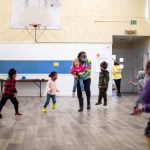Looking for inspiration to start the new decade off on the right foot? Our most popular education articles of 2019 explore how children develop purpose, how we can best support our students’ mental health and social-emotional development, why we benefit from listening to each other’s stories, and more.

And…if you want to put the scientific findings from these articles into practice, check out our new website for educators, Greater Good in Education (GGIE), officially launching on February 20, 2020.
In response to our readers’ call for more practical resources for the classroom, GGIE features free research-based practices, lessons, and strategies for educators to foster their students’ and their own well-being, and for school leaders to develop positive school climates—all in the service of cultivating kinder, happier, and more equitable classrooms and schools.
If you’d like to take a deeper dive into the science behind social-emotional learning, mindfulness, and ethical development, join us for our annual Summer Institute for Educators. Applications are due February 15, 2019.
To whet your appetite, here are the 10 best education articles of 2019, based on a composite ranking of pageviews and editors’ picks.
What Are the Best Ways to Prevent Bullying in Schools?, by Diana Divecha: A new study identifies the most effective approaches to bullying prevention.
How to Help Young People Transition into Adulthood, by Betty Ray: Modern “rites of passage” can help teens prepare for an uncertain future.
Five Childhood Experiences That Lead to a More Purposeful Life, by Maryam Abdullah: Research suggests that our paths to finding purpose can be shaped by early childhood experiences.
How Colleges Today Are Supporting Students’ Mental Health, by Amy L. Eva: Colleges and universities are addressing well-being in students with new and innovative approaches.
How Understanding Your Brain Can Help You Learn, by Jill Suttie: A new book explains six keys to learning that can help anyone overcome barriers to success in school or in life.
Four Ways Schools Can Support the Whole Child, by Lisa Flook: Beyond just teaching academics, schools can foster students’ development in their relationships, identity, emotional skills, and overall well-being.
How to Support Teens’ Social-Emotional Development, by Amy L. Eva: We need to appeal to teens’ need for status and respect for SEL to work in high schools.
How to Help Students with Learning Disabilities Focus on Their Strengths, by Rebecca Branstetter: We can empower students with learning disabilities with the language we use and the way we teach and guide them.
How to Become a Scientist of Your Own Emotions, by Jill Suttie: A Q&A with researcher Marc Brackett about how to cultivate emotional intelligence in ourselves and our kids.
What Happens When We Listen to Teachers’ Stories? by Amy L. Eva: Teachers of Oakland wants to change the conversation about education by humanizing teachers.
Bonus
What Teens Are Actually Thankful For (video), by Jane Park: A first-grade teacher, a best friend, a parent—high schoolers share their gratitude letters with their recipients.
A Lesson in Thanks and Vulnerability (podcast): A junior high school teacher spent his life defying stereotypes about how men should express their emotions. Here he takes on a new challenge: getting his students to express gratitude.
[“source=greatergood.berkeley”]



